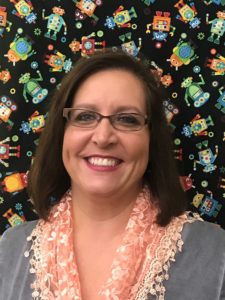In partnership with Code.org, Battelle is training 46 teachers in computer science. Last year, we profiled Amy Hill’s first impressions of her Code.org computer science training. We spoke with her again over lunch in January.
On her birthday, Amy Hill could have been anywhere. It was a Saturday with the snow finally melting after a week of bitter ice and cold. So, where was she celebrating?
 She was in Columbus, Ohio, meeting up with her Code.org cohort.
She was in Columbus, Ohio, meeting up with her Code.org cohort.
If you ask her why, she won’t hesitate with an answer.
“I love sitting down with these girls!”
Code.org sponsors computer science professional development, but it goes beyond a “one-and-done” approach. By providing feedback and several touchpoints throughout the year, Code.org gives teachers an opportunity to implement in the classroom, then collaborate to address student needs.
“That collaboration part is the key for this being successful,” said Hill. She feels like a teacher doesn’t have to do every single piece of a lesson, but just “what works for your kids.” Then, when she meets up with her cohort, she can learn what works in her peers’ classrooms.
She got most excited when she worked with students to address a solution to a problem that nobody anticipated. “Code.org didn’t show them how to do it,” she notes, but together, “we figured it out through some of the things we had already learned.”
As mentioned in our previous spotlight on Amy, she teaches in a low-income rural school. There, she gets a variety of reactions from parents, mostly excited and positive.
“You do have a few skeptics every once in a while,” mentioned Hill. “I had one parent who was like – well where are they going to use this somewhere else?”
To Hill, CS is relevant to many potential careers, even outside of coding and programming.
“If you think about the jobs when they graduate high school, or when they go and graduate technical school or college… how many of those jobs do you think are going to be based on technology? Probably 90%.”
She’s right. According to the U.S. Bureau of Labor Statistics, seven out of the ten largest STEM occupations are computer related. And we know that STEM job openings are outpacing the supply of people to fill them.
With the help of CODE.org, Hill believes that her classroom is getting prepared for the future.
“Even if they never have to code a computer… just knowing the background makes them more ready for that 21st century.”